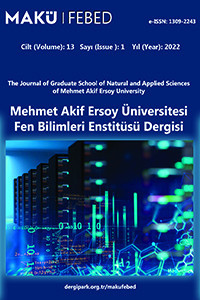Imidacloprid’in Farklı Dozlarının Panonychus ulmi Koch (Acari: Tetranychidae) ve Predatörü Neoseiulus californicus (McGregor) (Acari:Phytoseiidae)’un Yaşam Çizelgesi Üzerine Etkileri
Panonychus ulmi, Neoseiulus californicus, İmidacloprid, Hayat tablosu
Effects of Different Doses of Imidacloprid on the Life Table of Panonychus ulmi Koch (Acari: Tetranychidae) and Predator Neoseiulus californicus (McGregor) (Acari: Phytoseiidae)
Panonychus ulmi, Neoseiulus californicus, İmidacloprid, Life table,
___
- Ako, M., Borgemeister, C., Poehling, H.M., Elbert, A., Nauen, R. (2004). Effects of neonicotinoids insecticides on the bionomics of twospotted spider mite (Acari: Tetranychidae). Journal of Economic Entomology 97: 1587–1594.
- Ako, M., Poehling, H.M., Borgemeister, C., Nauen, R, (2006). Effect of imidacloprid on the reproduction of acaricide-resistant and susceptible strains of Tetranychus urticae Koch (Acari: Tetranychidae). Pest Management Science 62: 419–424.
- Argov, Y., Berkeley, M., Domeratzky, S., Melamed, E., Weintraub, P., Palevsky, E. (2006). Identification of pollens for small scale mass rearing of Neoseiulus californicus and a novel method for quality control. IOBC Wprs Bulletın 29(4): 127.
- Balcı, H. , Ay, R., (2018). Bazı Pestisitlerin Tetranychus urticae Koch'nin ergin yaşam süresi ve yumurta verimine etkileri. Süleyman Demirel Üniversitesi Fen Bilimleri Enstitüsü Dergisi 22:(2), 1010-1015.
- Barati, R., Hejazi, M. J. (2015). Reproductive parameters of Tetranychus urticae (Acari:Tetranychidae) affected by neonicotinoid insecticides. Experimental and Applied Acarology 66: 481–489.
- Birch, L. C. (1948). The intrinsic rate of natural increase of an insect population. Journal of Animal Ecology 17:15-26.
- Bozdoğan, H., Bahadıroğlu, C. (2014). Çeşitli insektisit gruplarının Chrysopidae Schneider 1851 familyasına ait bazı böcekler üzerindeki etkisi. Bitlis Eren Üniversitesi Fen Bilimleri Dergisi 3(2): 11-17.
- Castagnoli, M., Liguori, M., Simoni, S., Duso, C. (2005). Toxicity of some insecticides to Tetranychus urticae, Neoseiulus californicus and Tydeus californicus. BioControl 50: 611–622.
- Duso, C., Malagnini, V., Pozzebon, A., Castagnoli, M., Liguori, M., Simoni, S. (2008). Comparative toxicity of botanical and reduced-risk insecticides to mediterranean populations of Tetranychus urticae and Phytoseiulus persimilis (Acari:Tetranychide, Phytoseiidae). Biological Control 47:16-21.
- El Taj, H. F., Jung, C. (2012). Effect of temperature on the life-historytraits of Neoseiulus californicus (Acari: Phytoseiidae) fed on Panonychus ulmi. Experimental and Applied Acarology 56(3): 247-260.
- Ewing, H. E. (1912). The occurrence of the citrus red spider, Tetranychus mytilaspidis Riley, on stone and pomaceous fruit trees in Oregon. Journal of Economic Entomology 5(5): 414-415.
- Forbes, V. E., Calow, P. (1999). Is the per capita rate of increase a good measure of population-level effects in ecotoxicology? Environmental Toxicology Chemical 18:1544–1556.
- James, D., (1997). Imidacloprid increases egg production in Amblyseius victoriensis (Acari: Phytoseiidae). Experimental and Applied Acarology 21(2): 75-82.
- James, D.G., Price ,T.S. (2002) Fecundity in two-spotted spider mite (Acari: Tetranychidae) is increased by direct and systemic exposure to imidacloprid. Journal Economic Entomology 95:729–732.
- Kumargal, D., Çömelekoğlu, Ü., Aşkın, A. (2012). İyon kanallarını hedef alan insektisitler. Mersin Üniversitesi Sağlık Bilimleri Dergisi 5(2): 7-13.
- Marcic, D., Prijovic, M., Drobnjakovic, T., Medjo, I., Peric, P., Milenkovic, S. (2015). Greenhouse and field evaluation of two biopesticides against Tetranychus urticae and Panonychus ulmi (Acari: Tetranychidae). Pesticide Phytomed 27(4): 313–320.
- Maroufpoor, M., Ghoosta, Y., Pourmirza, A.A., Lotfalizadeh, H. (2016). The effects of selected acaricides on life table parameters of the predatory mite, Neoseiulus californicus fed on European red mite. North-Western Journal of Zoology 12(1): 1-6.
- McMurtry, J. A., Croft, B. A. (1997). Life-styles of phytoseiid mites and their roles in biological control. Annual Review of Entomology 42(1): 291-321.
- Moraes, G. D., McMurtry, J. A., Denmark, H. A., Campos, C. B. (2004). A revised catalog of the mite family Phytoseiidae. Zootaxa 434: 121-128.
- Sarıtaş, E., Ay, R. (2016). Panonychus ulmi (Koch) ve Neoseiulus californicus (Mc Gregor)’un üreme gücü ve yaşam sürelerine bazı pestisitlerin etkisi: hormoligosis. Türkiye Entomoloji Dergisi 40 (1): 97-106.
- Stark, J.D., Banks, J.E. (2003). Population-level effects of pesticides and other toxicants on arthropods. Annual Review Entomology 48:505–519.
- Szczepaniec, A. S., Creary, F., Laskowski, K.L., Nyrop, J.P., Raupp, M.J. (2011). Neonicotinoid insecticide imidacloprid causes outbreaks of spider mites on elm trees in urban land-scapes, PLoS One 6(5): 200-218.
- Szczepaniec, A. M., Raupp, J. (2013). Direct and indirect effects of imidacloprid on fecundity and abundance of Eurytetranychus buxi (Acari: Tetranychidae) on boxwoods. Experimental and Applied Acarology 59(3): 307–318.
- Welty, C. (1995). Survey of predators associated with European red mite (Panonychus ulmi; Acari: Tetranychidae) in Ohio apple orchards. The Great Lakes Entomologist 28(2): 5-11.
- Wang, L., Zhang, Y., Xie, W., Wu, Q., Wang, S. (2016). Sublethal effects of spinetoram on the two-spotted spider mite, Tetranychus urticae (Acari: Tetranychidae). Pesticide Biochemistry and Physiology 132: 102–107.
- Yin, W. D., Qiu, G. S., Yan, W. T., Sun, L. N., Zhang, H. J., Ma, C. S., Adaobi, U. P. (2013). Age-stagetwo-sex life tables of Panonychus ulmi (Acari:Tetranychidae), on different apple varieties. Journal of Economic Entomology 106 (5): 2118-2125.
- Yayın Aralığı: Yılda 2 Sayı
- Başlangıç: 2010
- Yayıncı: Burdur Mehmet Akif Ersoy Üniversitesi
Binalarda Enerji Verimliliği Uygulamaları: MAKU Mühendislik Mimarlık Fakültesi Örneği
Yeşil Yol Planlama: Denizli Pamukkale İlçesi Örneği
Murat ZENGİN, Duygu DOĞAN, Sinem ÖZDEDE
Çanakkale Kentsel Yapısına Eleştirel Bir Yaklaşım: Butik Kent
Hicaznar Nar (Punica granatum L.) Çeşidinde İyi Tarım Uygulamaları (İTU)
Çimento Esaslı Odun Kompozit Malzemelerin Üretim Prosesi ve Özellikleri Üzerine Bir Çalışma
Halil Turgut ŞAHİN, Ali İhsan KAYA, Ömer Ümit YALÇIN, Şemsettin KILINÇARSLAN, Yasemin ŞİMŞEK, George İ. MANTANİS
2.45 GHz Frekasında Optimum Bant Durduran Filtre Tasarımı ve Optimizasyonu
Burdur İlindeki Mevcut Güneş Enerjisi Santrallerinin (GES) Mekansal Uygunluğunun Değerlendirilmesi
Sibel YORULMAZ SALMAN, Cenk KESKİN, Betül BAL, Mustafa Onur DÖNMEZ
